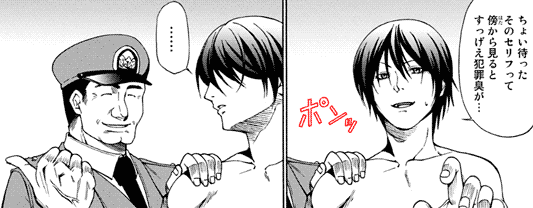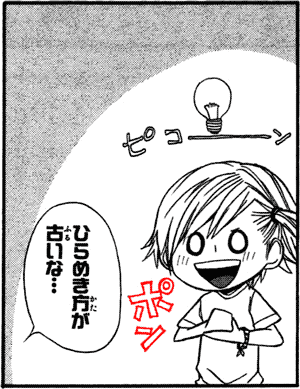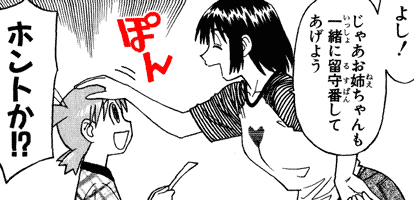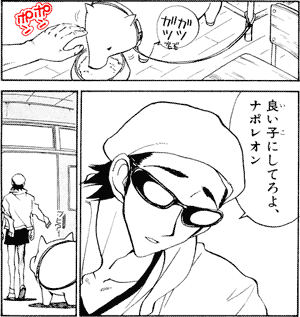In Japanese, pon ポン has multiple meanings: it's an onomatopoeia for tapping, bopping or hitting a drum, it's a play in mahjong, and it's the morpheme hon 本 with a handakuon 半濁音.
Onomatopoeia
When pon ポン is an onomatopoeia, it's for the sound of hitting a type of drum, and for lightly tapping or bopping something. For reference, some examples:
Shoulder Tap
The pon ポン onomatopoeia is used in shoulder taps in manga.
- Context: Nitta Yoshifumi 新田義史 says what he did in a bar.
- ojisan, ikura nandemo {hidoi} to omoimasu
おじさん いくら何でもひどいと思います
[Mister], [no matter the circumstances] [I] think {[what you said] is horrible}.- ojisan
おじさん
Uncle.
A way to refer to uncle-aged older men. - ikura nandemo
いくら何でも
No matter how much, no matter the circumstances, regardless of what happened, etc.
- ojisan
- honto ni..... {kakeru} kotoba mo nai wa......
ほんとに・・・・・・かける言葉もないわ・・・・・・
Really...... [I] don't even have [what to say]......- honto - same as hontou 本当, with long vowel shortened
- kotoba wo kakeru
言葉をかける
To pour words [onto someone]. (literally.)
To give someone words. To talk with someone.
- pon
ポン
*tap* - furufuru
フルフル
*shaking [head disapprovingly sideways]*
- Context: Kitahara Iori 北原伊織 is talking with someone that says something that could be misinterpreted badly.
- choi matta
ちょい待った
Wait a bit. - sono serifu tte {hata kara miru} to suggee hanzai-shuu ga...
そのセリフって傍から見るとすっげぇ犯罪臭が・・・
That line, if {seen by a third-person}, [it] [has] an incredibly criminal smell. (literally.)
If someone hears that without context, they'll think it's a crime.
- serifu 台詞 - a line, in the sense of dialogue, something that someone says, or said.
- hata kara miru
傍から見る
To see from the sidelines, in the sense of how an onlooker interprets a situation they aren't involved in, without full context. - suggee - same as sugoi すごい, with changes in pronunciation.
- X-shuu
〇〇臭
[To have] an X smell. To reek of X. To appear to be X, such that other people can tell it's X from how it looks like.
- pon'
ポンッ
*tap* - ......
- omawarisan
お巡りさん
Police offer. (the sort that patrols.) - junkai suru
巡回する
To go around [a place]. To patrol. To tour.
- omawarisan
Fist Hitting Palm
The pon ポン onomatopoeia is also used in the fist hitting palm idea gesture.
- te wo pon to tataku
手をポンと叩く
To hit [one's] hand with a pon.
- Context: Kotoishi Naru 琴石なる has an idea.
- pikoon
ピコーン
*light turning on*
- See also: idea light bulb.
- pon
ポン
*for the fist hitting palm gesture* - hirameki-kata ga furui na...
ひらめき方が古いな・・・
[Your] way of [having ideas] is old, huh...
Anime: Jashin-chan Dropkick, 邪神ちゃんドロップキック (Episode 10)
- Context: Yusa says she tried to sell ice cream in hell, but for some reason it didn't sell well. She was told it was because hell was frozen over and nobody would buy ice cream in such cold weather, prompting her to gesture and say:
- aa, naruhodo
あー、なるほど
Ah, [I see it now].
Head Pat
The pon ポン onomatopoeia is also used for head pats, or rather, head taps.
- Context: upon returning home with Ayase Fuuka 綾瀬風香: Yotsuba finds a note from his father saying that he went to the store and that she should take care of the house while he's away. Learning this, Fuuka says:
- yoshi!
よし!
Alright! - jaa oneechan mo {issho ni} rusuban shite-ageyou
じゃあお姉ちゃんも一緒に留守番してあげよう
Then [I]'ll [stay here] {together [with you]}..- oneechan - "older sister," also a way to refer to young women not related to you, and used by them to refer to themselves, too.
- rusuban - "stay-at-home duty," in the sense of someone leaving home, and someone else staying there to take care of the house.
- ~te-ageyou - volitional form of ~te-ageru ~てあげる, [to do something] for [someone else]."
- pon
ぽん
*head tap* - honto ka!?
ホントか!?
Really?- honto - same hontou 本当, with long vowel shortened.
- honto - same hontou 本当, with long vowel shortened.
- Context: Harima Kenji 播磨拳児 feeds Napoleon, patting him on the head.
- gatsu gatsu
ガツガツ
*eating noise* - ponpon
ポンポン
*tap tap* - ii ko ni shitero yo,
Naporeon
良い子にしてろよ、ナポレオン
Be a good [pig], Napoleon.- shitero - contraction of shite-iro, meireikei 命令形 of shite-iru している.
- Harima Kenji leaves Napoleon behind.
- buhi?
ブヒ?
*concerned pig noise*
In Mahjong
In mahjong, 麻雀, pon ポン is something a player can say when another player discards a tile.
In the game, a player has to form a pattern of, typically, four triplets or sequences, and one pair, either by simply discard tiles and picking tiles in their turn, or from calling tiles discarded by other players.
The pon is the call used when a discarded tile completes a triplet. For example, if you have 2 white tiles (white dragons) and another player discard a third white dragon, you can call pon on that tile.
The formed triplet is then moved to the side, visible for everyone to see, with one tile sideways indicating from which player the you took the third tile from.
By the way, there are only four tiles of each kind in total. The call to complete a quadruplet is kan カン.
It's also possible to call a tile to complete a sequence (e.g. 1, 2, 3), this is a chii チー, but you can only call chii on a tile discarded immediately before your turn, whereas pon and kan can be called on any discard tile.
hon 本
When hon 本 is suffixed to something, it sometimes turns into ~pon ~ぽん. This typically occurs with the counter for long cylindrical objects:
- ippon
一本
One long cylindrical object. - nihon
二本
Two long cylindrical objects. - sanbon
三本
Three long cylindrical objects.





No comments: